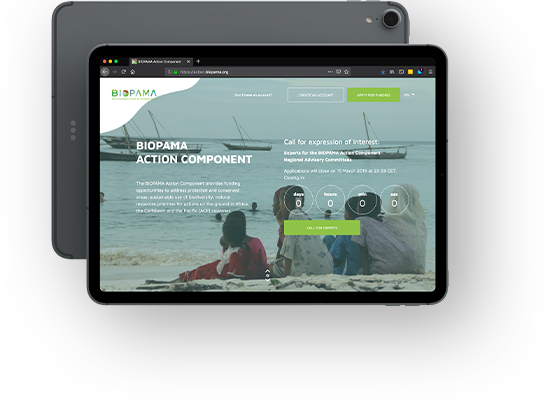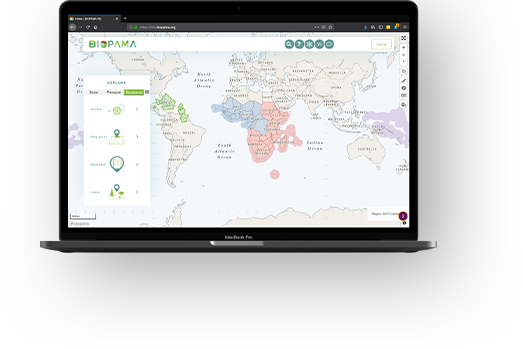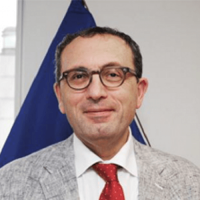Le BIOPAMA
Le Programme pour la biodiversité et la gestion des aires protégées (BIOPAMA) aide les pays d’Afrique, Caraïbes et Pacifique (ACP) à traiter leurs priorités pour améliorer la gestion et la gouvernance de la biodiversité et des ressources naturelles. Le BIOPAMA offre divers outils, services et financement aux acteurs de la conservation dans les pays ACP.
Le Programme pour la biodiversité et la gestion des aires protégées (BIOPAMA) vise à améliorer la conservation à long terme et l’utilisation durable des ressources naturelles dans les pays d’Afrique, Caraïbes et Pacifique (ACP), dans les aires protégées et les communautés avoisinantes. C’est une initiative du Groupe des États ACP, financée par le 11e Fonds européen de développement de l’Union européenne, mis en œuvre conjointement par l’Union internationale pour la conservation de la nature (UICN) et le Centre commun de recherche de la Commission européenne (CCR). BIOPAMA is an initiative of the Africa, Caribbean and Pacific Group of States financed by the European Union’s 11th European Development Fund.
Download PresentationStay Updated
The Latest
News From
Biopama
Nouvelles du projet de développement de l’écotourisme communautaire dans les monuments de l’est du Burundi
Le ministère de l’Environnement de la Côte d’Ivoire est invité au 1er Congrès Africain des Aires Protégées en mars prochain à Kigali
Lancement du Réseau des coaches pour l’efficacité de gestion des aires protégées (RACEGAP)
Save the Date
Our Events
Across
the World
- Global
International Biodiversity Day 2022 – BIOPAMA Webinar / Journée internationale de la biodiversité 2022 – Webinaire de BIOPAMA
Inaugural meeting of the BIOPAMA Latin America and Caribbean METT Support Network
Where we work
-
9,000+ PROTECTED AREAS:
Supporting their improved management and governance
-
1 BILLION+ PEOPLE:
Their livelihoods depend on the sustainable use of natural resources
-
2000+ STAFF:
Already trained by BIOPAMA for enhancing their abilities to manage protected areas
-
21 MIL EUR:
New commitments for actions on the ground
Join our Community & Contribute
Subscribe to our News
SubscribeThe BIOPAMA community on Teams is open to all who have an interest in biodiversity and protected area management, especially in the African, Caribbean and Pacific regions. Click on "Join" to be added to the BIOPAMA Community on Teams. We will bulk import the addresses in Teams mid-February 2021, and after that we will add new members on a weekly basis.

Testimonials
Funding & Tools

BIOPAMA Action Component
The BIOPAMA Action Component provides funding opportunities to address protected and conserved areas, sustainable use of biodiversity, natural resources priorities for actions on the ground in Africa, the Caribbean and the Pacific (ACP) countries.
Apply for Funding
The Reference Information Systems (RIS)
The RRIS is a tool that gathers in one place the information from the many knowledge products, projects, databases on protected areas, species and related information, in addition to the data uploaded, created and generated by the users themselves. The Joint Research Centre is responsible for the development of these tools, uploaded with the information collected through the functions of the Observatories.
Explore Data




